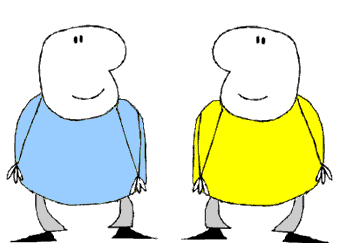by: Royane Real
Some body language experts claim that only about 7% of our messages to other people are communicated through the words we speak. The rest of our messages are conveyed through our body language, tone of voice, and facial expressions.
During your entire life you have been sending messages to others through your posture, gestures, and facial expressions.
Even if you never say a word, your face and body are constantly sending out messages to other people about
 your state of mind, your happiness, and your level of confidence.
your state of mind, your happiness, and your level of confidence.When you were an infant, before you learned to speak, people were peering into your little baby face, looking at your gestures, and listening to your little cries and gurgles, trying to decipher what kind of mood you were in, and what you were trying to say.
And you have been reacting to the body language, voice tone, and facial expressions of the people around you all your life, even though you may not have been consciously aware of it.
What sorts of messages are you conveying to others with your body language? Does your body language encourage other people to approach you? Or do you subconsciously warn them to stay away?
How do you usually stand or sit when you are with other people? What are you doing with your hands? Where are you looking with your eyes?
Does your face express interest in the people you are with, or does your face stay a tense, stony mask?
When you are sitting or standing, do you usually cross your arms across your chest? If this is your typical way of standing or sitting, how do you think other people interpret this posture? Did you realize that most people will subconsciously interpret your arms crossed in front of your chest as a signal that you don’t want anyone to approach you? Only the bravest souls are likely to come forward when you adopt this posture.
If you stand awkwardly, with your chest slumped forward, your shoulders drooping, and your eyes avoiding everyone else, people are likely to decide you are very depressed or completely lacking in confidence. They may fear that trying to talk with you will be an awkward experience.
When you stand awkwardly, you do not project any sign that you are confident in yourself, or that you have any interest in the people around you. Instead you look like you are trying to disappear.
No matter how desperately you want someone to come over and befriend you, if your body language projects awkwardness or disinterest in others, it’s not very likely that many people will try to start a conversation with you.
If some body language signals can frighten people away, are there signals that will encourage people to come forward and approach you? Yes, you can look much more approachable to others if you adopt body language that is open and non-threatening.
Whether you are sitting or standing, aim for a posture that is upright and alert, yet relaxed. If you notice that your chest or shoulders are slumping, straighten up.
Become aware of the way you are breathing. Does your breath move in and out smoothly? Or does it move with jerky little stops and starts?
If you notice that you are holding your breath, or breathing in a shallow, jerky manner, this is a sign of anxiety. When you breathe shallowly, you have to breathe more often, which can increase your appearance of nervousness. Consciously tell all the muscles of your body to relax. Use your abdomen to help you breathe smoothly and deeply. Let the bottom part of your lungs fill up with air as well as the top.
What are you doing with your hands? If you get nervous in social situations, you may feel that no matter what you do with your hands, it’s the wrong thing. Many people who cross their arms in front of their chest are probably doing so at least in part because they don’t know where else to put their hands.
You should never cross your arms in front of your chest unless you really don’t want anybody to approach you. That is the message this gesture sends out.
If you want to look open and approachable, keep your arms at your sides, or put one hand in your pocket. If you want to hold something in one hand, keep your hand at the side of your body, and not in front of you. Holding your arm in front of your body can be seen as a signal that you want to defend yourself against other people.
Stay aware of and focused on your surroundings and the people around you. If you find yourself tuning out your surroundings, you will start to focus too much on your negative inner sensations and thoughts. This can quickly increase your anxiety to a very uncomfortable level.
What sort of facial expression should you have if you want people to approach you?
In most cases, a gentle, pleasant smile should do the trick. Too much of a smile that never softens can look forced and nervous. A pleasant smile with a twinkle in your eyes will convey the impression that chatting with you will be a pleasant experience.
About The Author
This article is taken from the new book by Royane Real titled "How You Can Have All the Friends You Want - Your Complete Guide to Finding Friends, Making Friends, and Keeping Friends" If you want a better social life and more friends in your life, download it today at www.royanereal.com.
====================================















